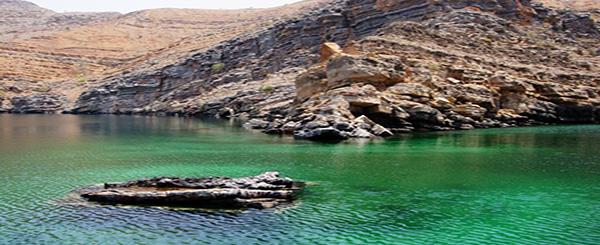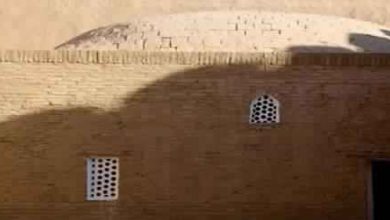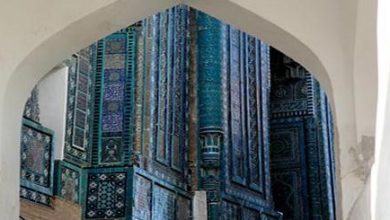UMAR IBN AL-KHATTAB

UMAR IBN AL-KHATTAB
May Allah Be Well Pleased With Him
(Life : (prob) 586AD – 644AD)
(Caliphate : 634AD – 644AD)
Preface: This is only a summary of the life of Umar Ibn Al-Khattab (May Allah be Pleased with Him) and in no way can it cover all the points of his life. It is not intended to be a biography, but rather a glimpse of the main incidents of his life so that we can get an idea of his character. For ease of reading, we have not inserted “May Allah be pleased with him (RA)” each time his name or the name of each Companion is mentioned, but please take it that the salutations apply to all of them, may Allah be pleased with them all.
Umar used to say: “What will you say to your Lord later?” – summing up his religion and his method of life.
Sahih Bukhari 5:36 : Narrated Aslam:
Ibn `Umar asked me about some matters concerning `Umar. He said, “Since Allah’s Apostle died. I have never seen anybody more serious, hard working and generous than `Umar bin Al−Khattab (till the end of his life).”
PRE CONVERSION TO ISLAM
Little is documented about his life prior to his submission to Islam. We know that Umar was born into a respected Quraish family, thirteen years after the Messenger (SAW) was born. He learnt to read and write whilst still a child, which was rare in Mecca at that time. A merchant by trade, he was widely travelled as a result. He was a large man, it was said that he never walked among a group of men except that he was the tallest amongst them. He was a skilled horseman and was notorious for his fearsome temper. By some accounts, he was left handed, while others report him to be ambidextrous. His swiftness of temper, coupled with his extraordinary strength, made a terrifying and intimidating combination. However, he was also renowned for his strong sense of justice, and time proved that he judged himself harsher than he did anyone else.
Prior to becoming Muslim, he was a sworn enemy of Islam. The idea of Muhammad (SAW) preaching the Oneness of God in Mecca enraged Umar greatly, as he saw this as a great outrage and insult to the pagan practices of his forefathers. Umar was openly hostile, and even physically violent, to those who embraced Islam. Even when his slave-girl accepted Islam, he beat her on a daily basis until he was exhausted and said “I stopped because I am tired, not out of pity for you”.
EVENTS LEADING UPTO AND INCLUDING CONVERSION
Umar’s acceptance of Islam is perhaps one of the most extraordinary.
As Muhammad SAW’s influence grew, Umar became increasingly enraged. In the sixth year of the revelation, Umar was appointed by a group of Quraish men to kill the Prophet SAW. He set out towards the Prophet SAW, sword in hand, ready to kill him. Enroute he met a friend and when Umar explained what he intended to do, imagine Umar’s horror when his friend said “Why don’t you take care of your own family first and set them right?” It turned out that Umar’s own sister, Fatimah, and her husband, had embraced Islam!
He was so mortified and furious that the Islamic had crept into his own household that he went straight to Fatimah’s house where he heard the voice of his brother in law, Khabbab bin Aratt, reciting from the Qur’an. Umar swiftly started assaulting Khabbab, whereupon Fatimah threw herself between Umar and her husband in order to defend the latter. Umar struck her violently, until she was bleeding. Injured as she was, Fatimah defiantly told Umar “O Umar, you can do what you like, but you cannot turn our hearts away from Islam”.
These words had a profound effect on Umar. What was this faith that made weak women so strong of heart? He felt pity for his sister, and his instinctive sense of justice prevailed. So he asked Fatimah to show him what she was reading, so that he could know for himself what it was the Muhammad (SAW) had brought.
She refused to give it to him by saying “No, for none but the purified persons [i.e. clean from idolatry] are to touch it. Go and take a bath and get yourself purified”. He did so, returned and Fatimah gave him the Qu’ran.
“Ta-Ha. We have not sent down the Qur´an to thee to be (an occasion) for thy distress, But only as an admonition to those who fear ((Allah)) …” [Ta Ha, Chapter 20, 1-3]
He was astounded. It was as if the Qur’an was addressing him directly! He continued reading, and verse after verse, the light of the Qur’an penetrated his heart with its undeniable truth.
“A revelation from Him Who created the earth and the heavens on high. (Allah) Most Gracious is firmly established on the throne (of authority). To Him belongs what is in the heavens and on earth, and all between them, and all beneath the soil…”
He read verses 1-8 and 14-16 of Surat Ta Ha, and when he was done, his sense of justice could no longer deny the truth of the Message.
Unbeknownst to him, the Prophet SAW had also made a dua for this occasion – reported by Ibn Umar, the Messenger of Allah SAW said “O Allah, help Islam with one of the two men that is more beloved to You: Abu Jahl or ‘Umar ibn Al-Khattab. And the more beloved of the two to him was ‘Umar.”
Umar kissed the document and said “It is not proper that the One Who has sent down these Holy Verses should have a partner to be worshipped with Him. Guide me to the place where Muhammad SAW is present now”. He then went straight to the house of the Prophet (SAW). Once he was admitted in the house, the Prophet SAW asked him for the reason of his visit. Umar replied: ‘O Messenger of Allah, I have come to you in order to believe in Allah and His Messenger and that which he has brought from his Lord.” Upon hearing this, the Prophet SAW and the Companions shouted with elation “Allahu Akbar” so loudly that it could be heard at the Ka’bah!
CONTRIBUTIONS TO ISLAM DURING PROPHET’S (PBUH) LIFETIME
Public proclamation of Islam:
Umar was the first person to publicly proclaim Islam – he literally went door to door to houses of the inhabitants of Mecca such as Abu Jahl to announce his conversion to Islam. Their reaction was of course of hostility and dismay, for example Abu Jahl cursed him and slammed the door in his face! However, Umar’s courage was contagious, and his actions strengthened and boosted the morale of the small community of Muslims, who had until then, been forced to worship in the secrecy of their homes.
Worshipping before the Kaabah
Umar was renowned for his outspoken behaviour, and on more than one occasion, questioned the Prophet’s SAW decisions. An illustration of this is when the elation of Umar’s acceptance of Islam had subsided, he asked the Prophet SAW “Aren’t we on the right path here and in the hereafter?” The Prophet SAW replied affirmatively, upon which Umar asked “Why then, do we have to conduct our activities secretly? I swear by Allah Who has sent you with the Truth, that we will leave our concealment and proclaim our noble cause publicly.”
Hence, prompted by Umar, the Quraishi witnessed to their dismay the first group of Muslims approaching and worshipping before the Kaabah in broad daylight, a practice which is still followed more than 1,400 years later. This was the incident that gave him the title “Al Farooq” (he who distinguishes truth from falsehood).
With Umar as the physical guardian, the hostile Quraishi were hesitant to attack the Muslims, as Umar was a fearsome enemy and was swift to react.
Migration to Medina:
Umar migrated to Medina ahead of the Prophet SAW. Whilst many Muslims were migrating to Medina discreetly, Umar went to the Kaabah and announced his migration publicly, threatening “Any one who wants to make his wife a widow and his children orphans, should come and meet me there behind that cliff.” Umar’s strength and ferocity was such that he was capable of killing a man in a single blow, and he was armed with his sword and his arrows. Not surprisingly, none of the Quraishi dared to stand in his way.
Consultation:
It was not uncommon that whenever a difficult situation arose, the Prophet SAW would seek the counsel of Umar and Abu Bakr. In many instances, Umar and Abu Bakr took divergent views, Umar’s opinion being inclined to being harder than Abu Bakr’s. On more than one occasion, however, Umar’s view was confirmed as the correct one, as affirmed by Allah Himself through the revelations that guided the Prophet SAW to the correct decision to address such circumstances. This included his view on the innocence of Aisha’ when her reputation and fidelity to Muhammad SAW was cast under severe doubt by the hypocrites.
On the authority of Abdur Rahman bin Ghanam, it was said that the Prophet SAW said to Abu Bakr and Umar that “if you two are agreed upon a counsel, I would not oppose you.”
The Battles:
Umar participated in many of the key Muslim battles and was often the right hand man of the Prophet SAW on the battlefield. He fought keenly in the Battle of Badr, Uhud and the Trench, the Conquest of Mecca, Hunayn and the Siege of Ta’if.
Father in law of Muhammad SAW:
Umar’s daughter, Hafsa, was widowed at a very young age when her husband was martyred during the Battle of Uhud. Her bereavement upset Umar greatly, but he was also aware that she had inherited his fiery temper. Hence he felt it best for her to be married to a much more mature man of a more sober temperament. He approached Abu Bakr, who evaded the subject, and the Uthman, who politely declined on account that he himself was not over the grief of his own wife, Ruqayya, the daughter of the Prophet SAW. Insulted, saddened and enraged, Umar complained to the Prophet SAW, whereupon the Prophet SAW assured him with the following words: “Rest assured, Hafsa will marry a man better than Uthman, and Uthman will marry a lady better than Hafsa.”
It transpired that Muhammad SAW had indicated to Abu Bakr and Uthman that he had intended to take Hafsa as his bride, hence their non committal replies when approached by Umar. Uthman was then married to the Prophet’s younger daughter, Umm Kulsum.
With this marriage, Umar’s status was brought at par with Abu Bakr’s, and both of them enjoyed the honour of being the Prophet’s SAW father in law.




